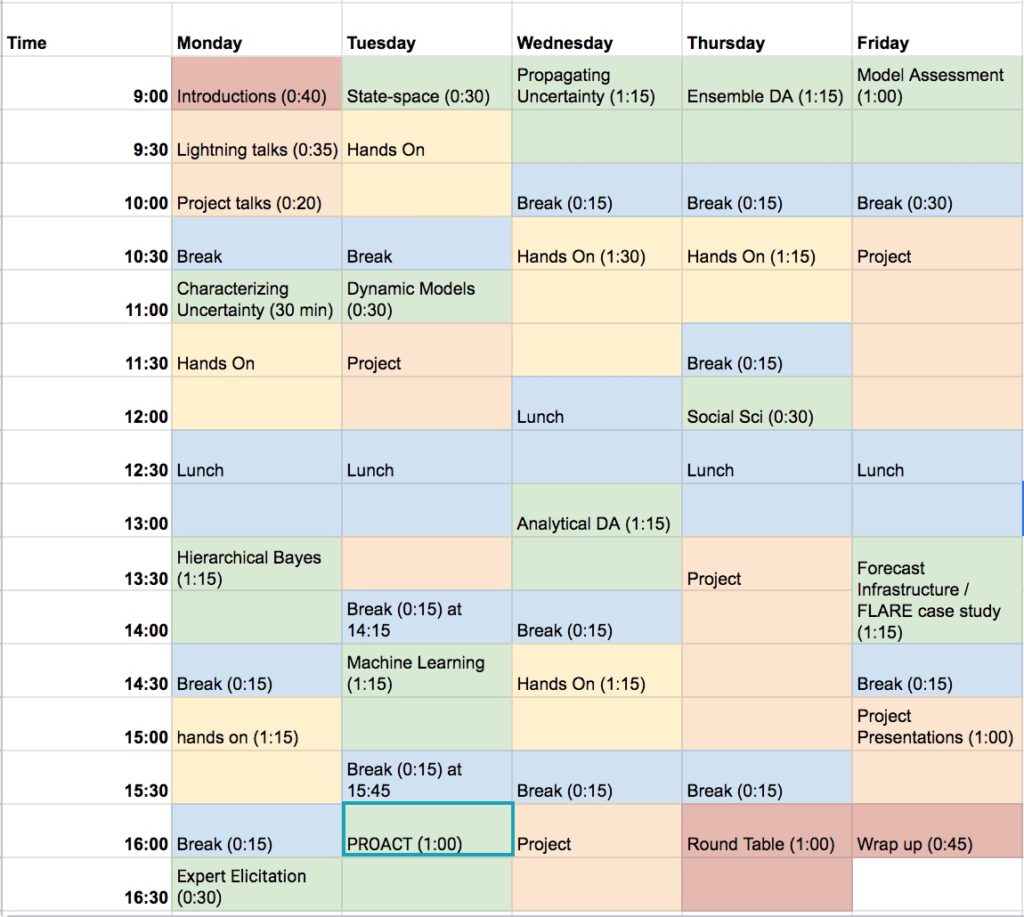June 7 – 12, 2020
Boston University
As part of the NSF-funded Near-term Ecological Forecasting Initiative this course targets graduate students, post-docs, and early career scientists interested in learning about ecological forecasting in a variety of contexts. In addition to academics, we reserve slots specifically for agency and NGO scientists. This course is adapted from the recently published Ecological Forecasting book by Dr. Michael Dietze and will highlight iterative forecasting approaches.
Topics include Bayesian statistics (simple models, hierarchical Bayes, state-space models, etc); fusing multiple data sources; forecast uncertainty propagation & assessment; iterative data assimilation; machine learning; decision science; and a range of ecological forecasting applications such as phenology, microbiomes, carbon, infectious disease, and aquatic productivity. The course provides a mix of lectures and hands-on applications, including a final end-of-week group project. More detail about course content and schedule will be posted soon, but for now please refer to the 2019 course page.
Instructors include Michael Dietze (Boston University), Shannon LaDeau (Cary Institute of Ecosystem Studies), Quinn Thomas (Virginia Tech), Kira Sullivan-Wiley (BU), Ethan Deyle (BU), Jason McLachlan (Notre Dame), Kathleen Weathers (Cary), and Jennifer Bhatnagar (BU).

Lecture slides and videos
Characterizing Uncertainty – video, slides, hands-on [Shannon]
Hierarchical Bayes – video, slides, hands-on [Shannon]
Expert Elicitation – video [Mike]
State Space Models – video, slides, hand-on [Kathryn, John]
Dynamic Models – slides, Rmd [Mike, Quinn]
Machine Learning – video, Rmd [Ethan]
PROACT (structured decision making) – [Mike, Kira]
Intro to Environmental Decision Making – video
Problems & Objectives – video
Performance Measures – video
Decision Alternatives – video
Consequences – video
Trade-offs – video
Propagating Uncertainty – video, slides, hands-on [Mike]
Analytical Data Assimilation – video, slides, hands-on [Mike]
Ensemble Data Assimilation – video, slides, hands-on [Quinn]
Social Science in Ecoforecasting – video [Kira]
Model Assessment – video, slides [Jason]
Forecast Infrastructure / FLARE – video [Quinn]
Bonus: Data Fusion – video, slides, hands-on
Applications
Academic applications are due February 1st, 2020
Application materials include:
- Application form
- CV
- Contact information for advisor (may be contacted later to provide a reference)
Course registration is free and includes breakfasts and lunches. A limited number of travel scholarships are available that could potentially cover some combination of travel, hotel, and dinners — the application form will ask you to indicate your ability to cover each of these three costs. If you have the ability to cover part of a cost, or will be applying for other travel funds that you won’t know about until later, please mark that as “partial funding”. Indicate “Full funding” if you are unable to attend the course without NEFI support. For reference, housing costs last year averaged $200/person/night assuming roommates (which NEFI will help assign).
Questions can be emailed to nefi.course@gmail.com.
There are no strict ‘prerequisites’ for the NEFI summer course. The course is largely R based so we will give preference to students that have a basic familiarity with R (basic data manipulation, visualization, and regression). Prior exposure to basic research computing skills (e.g. Software Carpentry) and data management/analysis skills (e.g. Data Carpentry) is helpful but not required. Prior experience with Bayes is likewise not required — we are planning on reserving Sunday as an optional Bayes primer/refresher.
Course location
The course is being hosted online via ZOOM due to COVID-19
